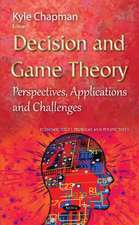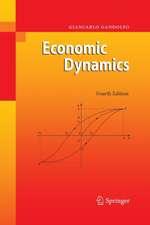Refinements of the Nash Equilibrium Concept: Lecture Notes in Economics and Mathematical Systems, cartea 219
Autor E. van Dammeen Limba Engleză Paperback – sep 1983
Din seria Lecture Notes in Economics and Mathematical Systems
-
 Preț: 360.02 lei
Preț: 360.02 lei -
 Preț: 383.93 lei
Preț: 383.93 lei - 15%
 Preț: 693.39 lei
Preț: 693.39 lei -
 Preț: 384.09 lei
Preț: 384.09 lei -
 Preț: 380.07 lei
Preț: 380.07 lei -
 Preț: 446.26 lei
Preț: 446.26 lei -
 Preț: 497.37 lei
Preț: 497.37 lei -
 Preț: 380.84 lei
Preț: 380.84 lei -
 Preț: 384.86 lei
Preț: 384.86 lei -
 Preț: 378.34 lei
Preț: 378.34 lei -
 Preț: 399.67 lei
Preț: 399.67 lei - 20%
 Preț: 360.93 lei
Preț: 360.93 lei - 15%
 Preț: 643.16 lei
Preț: 643.16 lei -
 Preț: 379.09 lei
Preț: 379.09 lei -
 Preț: 404.76 lei
Preț: 404.76 lei -
 Preț: 385.62 lei
Preț: 385.62 lei - 15%
 Preț: 644.49 lei
Preț: 644.49 lei -
 Preț: 379.09 lei
Preț: 379.09 lei -
 Preț: 345.50 lei
Preț: 345.50 lei -
 Preț: 425.80 lei
Preț: 425.80 lei -
 Preț: 378.34 lei
Preț: 378.34 lei - 18%
 Preț: 775.65 lei
Preț: 775.65 lei -
 Preț: 392.60 lei
Preț: 392.60 lei -
 Preț: 401.61 lei
Preț: 401.61 lei - 15%
 Preț: 646.43 lei
Preț: 646.43 lei -
 Preț: 382.18 lei
Preț: 382.18 lei -
 Preț: 378.34 lei
Preț: 378.34 lei - 15%
 Preț: 637.59 lei
Preț: 637.59 lei - 15%
 Preț: 647.27 lei
Preț: 647.27 lei -
 Preț: 377.73 lei
Preț: 377.73 lei -
 Preț: 447.84 lei
Preț: 447.84 lei - 15%
 Preț: 644.49 lei
Preț: 644.49 lei -
 Preț: 386.00 lei
Preț: 386.00 lei - 15%
 Preț: 654.43 lei
Preț: 654.43 lei -
 Preț: 415.02 lei
Preț: 415.02 lei -
 Preț: 411.54 lei
Preț: 411.54 lei -
 Preț: 398.92 lei
Preț: 398.92 lei -
 Preț: 398.92 lei
Preț: 398.92 lei -
 Preț: 392.75 lei
Preț: 392.75 lei - 15%
 Preț: 635.47 lei
Preț: 635.47 lei - 20%
 Preț: 653.56 lei
Preț: 653.56 lei -
 Preț: 379.86 lei
Preț: 379.86 lei -
 Preț: 495.46 lei
Preț: 495.46 lei -
 Preț: 447.99 lei
Preț: 447.99 lei -
 Preț: 378.71 lei
Preț: 378.71 lei - 15%
 Preț: 637.13 lei
Preț: 637.13 lei -
 Preț: 385.84 lei
Preț: 385.84 lei -
 Preț: 378.54 lei
Preț: 378.54 lei - 15%
 Preț: 666.55 lei
Preț: 666.55 lei
Preț: 381.98 lei
Nou
Puncte Express: 573
Preț estimativ în valută:
73.09€ • 78.16$ • 60.94£
73.09€ • 78.16$ • 60.94£
Carte tipărită la comandă
Livrare economică 18 aprilie-02 mai
Preluare comenzi: 021 569.72.76
Specificații
ISBN-13: 9783540126904
ISBN-10: 3540126902
Pagini: 164
Ilustrații: VI, 155 p. 4 illus.
Dimensiuni: 170 x 244 x 9 mm
Greutate: 0.27 kg
Ediția:1983
Editura: Springer Berlin, Heidelberg
Colecția Springer
Seria Lecture Notes in Economics and Mathematical Systems
Locul publicării:Berlin, Heidelberg, Germany
ISBN-10: 3540126902
Pagini: 164
Ilustrații: VI, 155 p. 4 illus.
Dimensiuni: 170 x 244 x 9 mm
Greutate: 0.27 kg
Ediția:1983
Editura: Springer Berlin, Heidelberg
Colecția Springer
Seria Lecture Notes in Economics and Mathematical Systems
Locul publicării:Berlin, Heidelberg, Germany
Public țintă
ResearchCuprins
1. General Introduction.- 1.1. Informal description of games and game theory.- 1.2. Dynamic programming.- 1.3. Subgame perfect equilibria.- 1.4. Sequential equilibria and perfect equilibria.- 1.5. Perfect equilibria and proper equilibria.- 1.6. Essential equilibria and regular equilibria.- 1.7. Summary of the following chapters.- 1.8. Notational conventions.- 2. Games in Normal Form.- 2.1. Preliminaries.- 2.2. Perfect equilibria.- 2.3. Proper equilibria.- 2.4. Essential equilibria.- 2.5. Regular equilibria.- 2.6. An “almost all” theorem.- 3. Matrix and Bimatrix Games.- 3.1. Preliminaries.- 3.2. Perfect equilibria.- 3.3. Regular equilibria.- 3.4. Characterizations of regular equilibria.- 3.5. Matrix games.- 4. Control Costs.- 4.1. Introduction.- 4.2. Games with control costs.- 4.3. Approachable equilibria.- 4.4. Proper equilibria.- 4.5. Perfect equilibria.- 4.6. Regular equilibria.- 5. Incomplete Information.- 5.1. Introduction.- 5.2. Disturbed games.- 5.3. Stable equilibria.- 5.4. Perfect equilibria.- 5.5. Weakly proper equilibria.- 5.6. Strictly proper equilibria and regular equilibria.- 5.7. Proofs of the theorems of section 5.5..- 6. Extensive Form Games.- 6.1. Definitions.- 6.2. Equilibria and subgame perfectness.- 6.3. Sequential equilibria.- 6.4. Perfect equilibria.- 6.5. Proper equilibria.- 6.6. Control costs.- 6.7. Incomplete information.- References.- Survey.











